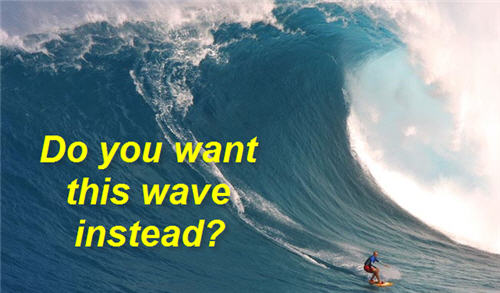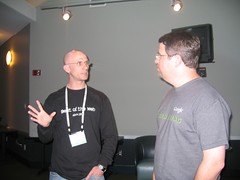I recently had the distinct pleasure of speaking to one of the Masters of Social Media, Brent Csutoras. He’s a leading internet marketing consultant who primarily specializes in social media, viral and search engine marketing strategies. Now working at BlueGlass Interactive.
Not only does he enjoy speaking on the topic, but he has a deep understanding and provides a mountain of great information you can use. I felt like that good hour we spent could have easily turned into days. I have attempted to distill our conversation about social media marketing into key learning points and some things you can do to get started today.
I should add that Brent is not only a tactician (“eats his own dog food”) but believes in good planning and sound strategies before starting any campaign online, whether SEO, PPC or social media.
Social media is *not* about just bookmarking your sites all over the place and joining Facebook, Linkedin and Twitter, and posting some “pitchy” links. I hope that’s not what you’re doing. Social media marketing (SMM) is serious business, and you must have the same attitude about everything you do.
I asked him about “how to go viral,” but it became evident quickly that it’s not just a checklist thing, but rather deep understanding of your marketplace, people and community strategies, and a lot of work. Brent works 12 to 14 hours every day, 365 days a year. (He gets a “break” when he speaks at search marketing conferences such as SES.)
He not only researches and tests all the models and tools but provides services to a number of high-profile clients (whom he will not, understandably, reveal). Brent has a massive passion for this field, wants to give back to the community and is considered one of the best.
Brent is also speaking at the upcoming Search Engine Strategies show in San Jose, coming up August 18. I’ll have summaries from that trip, too.
J: What is social media?
B: Social media definitions exist. However, I say it’s what people think of last: “links.” I think of social media as modern day link building. As you do your research, think about how to acquire quality links. While many social networks, tools and blogs have “no-follow” tags applied, there are “do-follows” out there. For example, at current time, Reddit follows links. That’s powerful. However, while links and early links are important, there is a phased approach to this. I call this the “wave model.” The first wave is all about the social community penetration and expansion into your community. The second wave is about the “links that really matter.” These are the page rank 8 to 9 links that most would sell their car for! I explain this further under “Social Media Builds Traffic” below.
J: Can you give me some background on how you got started and how social media impacted you?
B: I began in SEO, worked for a company in the health-care section and did the online marketing for about 50 to 60 clients. I listened to Webmaster Radio almost every day for a period. SEO Rockstars Todd Friesen, Greg Boser are top guys, and they seeded the right thoughts in my head; they got me wanting to be an internet marketer. I would listen, write down the information, study and learn every day–even in my car. That hasn’t stopped. It was at PubCon 2006 when I received a faster ramp-up when I met BOTW guys Greg and Brian Prince, and later in 2007 with additional network support in Todd Malicoat (SEO), Chris Winfield (SMM) and Neil Patel (SEO/SMM). Danny Sullivan invited me to speak as well. I was impressed with their credentials, but my personal style and approach [are] to be humble, and I listened and watched carefully. The interesting thing is that real world networking helped me before social media did. I often say that the rules of social media are very similar if not the same as the real world. You must conduct and act the same in order to succeed. Quality information prospers, however, just like anything on the net. I was accepted and so does Google, apparently 😉 (search for “brent” in Google).
J: How does a brand new person start with social media?
B: OK, assuming you have a plan with clearly defined objectives and goals (you must!)–consider social media, but also PPC, SEO. Include these as a whole picture, not just in parts. All activities need focused and ongoing attention, i.e., it never stops, and you must consider expenditures (people, resources, etc.) versus return. Social media can have high returns, but you must bring all of the tracks back to your original plan and measure it along the way. SM is not something you do on the side: You must dedicate an employee 100 percent or get a new one hired in, or outsource to an established expert.
Here’s a high-level starter plan you can use for social media:
Phase One: Write good, quality content! After strategy signoff, start by participating in the communities. Provide real and useful comments, no spam obviously. Do not try to game this; build your presence online over time. You might benefit looking at the smaller communities, befriend some of the (top) profiles there, and start looking at how you can provide good content for that community. Then, start pushing: “Butter the network,” as I call it.
Phase Two: Make your site social media-friendly. No funky popups or hard to read/use sites. Blogs are commonly used, but make sure it’s professionally designed. Lately, I’ve found that authoritative sites can and will do better–and even commercial sites. Think about this: “Where do you want to be sourced from?” Even unique content on a crappy site will not get the respect it deserves.
Phase Three: Continue researching and networking. Continue to build quality content for your own sites and the communities. This can take a long time, but the results are worth it!
J: Generally speaking, what do you consider “must-have” sites/profiles to establish?
B: Depending on your business, you might consider Facebook, Linkedin, Twitter, Digg, Reddit, Delicious, Sphinn, Propeller, StumbleUpon, but this is the order of importance at current time: Reddit, Digg, StumbleUpon, Twitter, Facebook, Delicious, Propeller, Sphinn and LinkedIn, listed last because it is just a static resume, not a wide network reach.
All articles should have references to these profiles. (Jon: Check a recent poll at Lee Odden’s TopRank Blog–Social Networks Influences)
J: How much time should a person spend on social media?
B: Let me answer it this way: What is your dedication? Have you made a firm to decision to proceed? If you only have an hour or so per day, don’t even try Digg or Reddit–you’d be better off spending some time on Sphinn, StumbleUpon or bookmarking services only. However, make sure to set up complete profiles for your company or brand on the sites you target. You will not get a lot of traffic or brand recognition at first, but you must/should start today.
However, as with any marketplace online, it depends on your niche. In any case, you do want to become the top dog in your industry, which will take time, as I mentioned. You may find yourself in six months of full-time, dedicated work, trial and error, until something sticks. What works for one will work differently for another. I see 99 percent success, and most of the time, but you never know when an administrator on an important network gives you a thumbs down, and you’re gone!
You must always be researching while online, look at the competition and find the sites with best-result-opportunities ratios. Then, you must discover the community that supports your business, and find the topics within it.
A tip to find out what people are talking about within your niche, do this: Go to Google and type ‘site: “digg.com” keyphrase.’ You can also go to most social media news sites and sort by most popular, etc. Your end goal in research is this: What has been successful? Then, build on that.
Update: Google just released its insights search tool, to help find patterns and analytics in search: Check out the Google Insights tool.
J: Word on the street says that social media builds traffic, but does not provide good ROI.
B: I don’t agree. Link building, which is the most important aspect to social, has an ROI. You can test your landing page to tune up the conversions, always–and you should. The people in SMM are not typically in a hot buy mode, true. However, the conversion is there, but it’s long term–certainly not gained in the first tier of traffic. However, as you build, you would hope to get the highest, best portion of the linkerati : the top bloggers, the central journalists for your niche, etc.
Let me explain how social media traffic works, in a tiered model. It builds on the “social media wave model” mentioned at the top.

First Tier Traffic – ‘Wave 1’: This is people who are not in your niche and not likely to be interested in anything more than the single article they have landed on. This is not the traffic or movement you want, but it is necessary and you don’t get to the 2nd tier without it. Google wants links and content. You can be ranked for a number of days short term and be visible across the board – but it can sometimes drop off. People providing blog posts, video posts, etc – will get you social community site links, but you need to look for natural links. That comes next.
Second Tier Traffic – ‘Wave 2’: RSS Feeds, bloggers, journalists – those that go back and write about you a few days or a week later, or even those who are looking for current stories to write about for their deadline in a few hours. The highly sought after PageRank 8-9 can be attained this way. These are the highly trusted links with the quality and authority that you want. (Jon: This is big, I missed this myself until I spoke to Brent).

As an example, imagine you hit the front page of Digg about your Dog business – having a unique and different story listed, pointing back to your blog about Dogs. If a major pet company picks up the story, and they link to you, you’ll receive potentially massive traffic and it will be highly targeted. You will be ranking well for your keywords for a longer time and as you continue building, more and more success will be created from your trust within the communities and search engines. If you have good quality content, people will naturally link to you. If you sell something, try to build focused, single keywords to promote. Build content around that.
J: How can I write viral content around boring products? For example, if I was a sink company, how would I drive massive traffic and build authority around it?
B: The “Top 10” type of lists work very well. People online often don’t read the entire article – they scan. Fun, controversial and useful tips and lists work all the time. You could create the “Top 10 most expensive sinks – ever”, or “How to unclog any sink in less than 10 seconds”. Make sure to get your keyword or phrase in the title. You may consider videos and images to complement your article. But, before you start crafting that killer piece, participate in the communities related to your topic. Research the commentaries, what type of content and write quality copy. All of social media is a huge time commitment, and you should have 100’s of people in your network, be recommended by others, seen as an active participant and add value and involved in the site – continually.
J: What are some of the tools of trade?
B: This is human intensive. And why not – it’s all about the communities and the people! To use automation tools and try to software-enable this will not work. There are however, some resources and tools that can help on the basics. You may consider creating some internal tools for yourself to help organize.
I wrote an article for Search Engine Land: “Tools for engaging in Social Media”, start with that. (Brent’s Social Media Tool List)
Here are some tools that I use:
- Digg alerter – must use
- StumbleUpon
- Propeller
- ShareAholic – powerful
J: Thanks, Brent – and in closing can you tell me what you will be speaking about at the SES show in San Jose?
B: I will cover things like a) what is social media, b) what is it good for, c) what sites give you the biggest bang and the all important d) “I get it, but why is it good?”
Dear Reader, as you have come to understand,social media is a lot work if you do want to get to the mountain top for your business. So, don’t just do what you must, but develop your plan, take complete action and go full force!
Brent, see you at the 2008 search engine strategies show – should be exciting this year…
